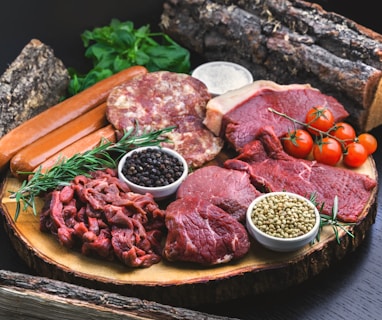The Impact of Meat Consumption on Sustainability
The production of meat has a significant impact on sustainability. Learn about the environmental impacts of meat production and how you can reduce your impact on the planet by eating less meat.
2 min read


The Environmental Impact of Meat Production
The production of meat has a number of environmental impacts, including:
Land use: The production of meat requires a lot of land. In fact, livestock production accounts for about 70% of all agricultural land use in the world. This land is often converted from forests or grasslands, which can have a negative impact on biodiversity.
Water use: The production of meat also requires a lot of water. It takes about 1,800 gallons of water to produce one pound of beef, and about 1,000 gallons of water to produce one pound of chicken. This water use can put a strain on water resources, especially in areas that are already facing water scarcity.
Energy use: The production of meat also requires a lot of energy. It takes about 10 calories of energy to produce 1 calorie of beef, and about 3 calories of energy to produce 1 calorie of chicken. This energy use contributes to climate change, as it comes from the burning of fossil fuels.
Greenhouse gas emissions: The production of meat also generates a lot of greenhouse gases. The livestock sector is responsible for about 14.5% of all human-caused greenhouse gas emissions. These emissions come from the production of feed, the manure produced by livestock, and the methane produced by ruminant animals such as cows.
The Sustainability of Meat Consumption
The environmental impacts of meat production make it a unsustainable food choice. If we want to reduce our impact on the planet, we need to reduce our consumption of meat.
There are a number of ways to reduce our consumption of meat. We can:
Eat less meat overall.
Choose lower-impact meats, such as chicken or fish.
Eat more plant-based foods.
Support sustainable meat production practices.
Green Goods Guide
There are a number of green goods that consumers can buy to help reduce their environmental impact from meat consumption. These include:
Plant-based meat alternatives: There are a number of plant-based meat alternatives available on the market, such as tofu, tempeh, and seitan. These products are a good way to reduce your consumption of meat without sacrificing taste or nutrition.
Sustainable meat: There are a number of sustainable meat production practices, such as grass-fed beef and free-range chicken. These practices can help to reduce the environmental impact of meat production.
Local meat: Buying local meat can help to reduce the environmental impact of transportation.
Conclusion
Meat consumption has a significant impact on sustainability. If we want to reduce our impact on the planet, we need to reduce our consumption of meat. There are a number of ways to do this, including eating less meat overall, choosing lower-impact meats, and eating more plant-based foods. We can also support sustainable meat production practices and buy green goods that help to reduce the environmental impact of meat consumption.
Meta Title: The Impact of Meat Consumption on Sustainability
Meta Description: The production of meat has a significant impact on sustainability. Learn about the environmental impacts of meat production and how you can reduce your impact on the planet by eating less meat.
Keywords:
meat consumption and sustainability
environmental impact of meat
sustainable meat
plant-based meat alternatives
local meat
We hope this blog post is helpful and informative. Please let me know if you have any questions.
